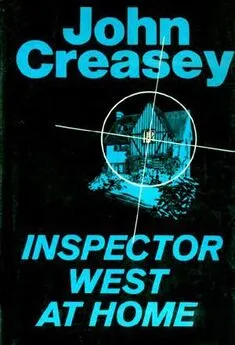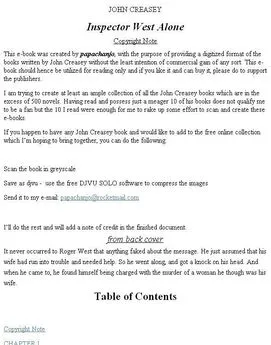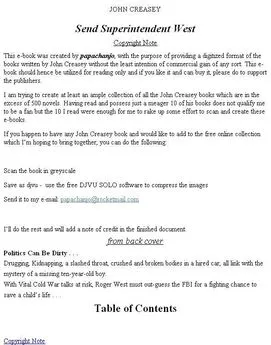John Creasey - Inspector West At Home
- Название:Inspector West At Home
- Автор:
- Жанр:
- Издательство:неизвестно
- Год:неизвестен
- ISBN:нет данных
- Рейтинг:
- Избранное:Добавить в избранное
-
Отзывы:
-
Ваша оценка:
John Creasey - Inspector West At Home краткое содержание
Inspector West At Home - читать онлайн бесплатно полную версию (весь текст целиком)
Интервал:
Закладка:
“ What did you say?”
“If I were to advance a theory like that, without evidence, you would tell me not to go out on a limb,” Roger said. “Someone else paid that money into my account and whoever it was can be found. When she’s found we’ll have the answer to all this. May I ask what other evidence you have?”
Chatworth said in a strained voice : “West, are you a consummate liar or do you seriously suggest that you have been framed?”
“Obviously, I’ve been cleverly framed,” said Roger. “You can’t have any unanswerable evidence or you wouldn’t have waited so long before acting. You can’t charge me or you would have done by now. May I have that four weeks’ leave of absence, sir?”
“I don’t know,” said Chatworth. “When did you arrange for Morgan to break into your house?”
With anyone else, Roger might have given himself away. For years he had been used to such unexpected questions and he had trained himself never to be taken off his guard. His mood changed, however, but he felt sure that Morgan would have made no admission, so he answered promptly :
“I didn’t.”
“Morgan’s finger-prints were found in your bedroom this afternoon and he was seen visiting you this evening.”
“There’s no reason why his prints shouldn’t be there,” Roger said. “He’s visited me often enough.”
“Do you usually take visitors to your bedroom ?”
“Frequently,” Roger replied. “I use it as an office sometimes. Morgan has been helpful recently, and as soon as I realised what Abbott was after I asked him to help me.”
“Help you to do what ?”
“Find the answer to this mystery.”
Chatworth closed one eye again and looked at the ceiling. His fingers, covered with a mat of fair hair, drummed on the polished surface of the desk and Roger waited with growing tension.
CHAPTER 6
The Lady So Beautiful
“ GO On,” urged Mark Lessing.
“What did he say?” demanded Janet breathlessly.
“Not a great deal,” said Roger, who had told them the story of his interview with Chatworth. “Apparently Pep’s story bore mine out. The denial that you’d been paying the cash in floored the old boy, I think. He was quite reasonable, as far as it goes. In the circumstances, suspension was the only thing, and leave of absence wouldn’t do. He’s right, of course. He gave me the impression that he expects me to get around a bit and will be prepared to listen to any evidence I dig up.”
“So I should think!” exclaimed Janet. “I’ll never like that man again.”
“Oh, I don’t know,” said Roger. “Those entries, occasional rumours from Joe Leech” — he uttered the bookmaker’s name very softly — “and other indications all pointing towards me, must have made it look black.”
It was nearly midnight but none of them looked tired and there was a kettle singing on the hob and an empty teapot warming by the fire. Roger was sitting back in an easy chair wriggling his toes inside his slippers. Mark was opposite him, and Janet was curled up on a settee between the two armchairs.
Tie didn’t tell you who’s supposed to have bribed you?” inquired Mark.
“No. He was reticent about that, which probably means that he doesn’t know for certain, but that he thinks the case hasn’t really broken open yet. He didn’t say much more,” he repeated. “A few generalities suggested that this is supposed to have been going on since about Christmas, when I hit upon some particularly clever racket and accepted bribes and held my tongue. Abbott’s been working on the case from the beginning.”
“What a snake he is,” said Janet.
“It wasn’t a pleasant job,” Roger replied, “and—”
“Darling, there are limits to the spirit of forgiveness.”
“Oh, I don’t know,” interjected Mark. “Better too much than too little, and although no one loves Abbott, he’s good at his particular brand of inquiry. When the cashiers have said “no” about Janet we’ll all feel better. You learned nothing else ?”
“Not from Chatworth. Eddie Day gave me Joe Leech’s name and Cornish promised to find the taxi-driver.” He had told them about the note from ‘K’. “If I can find out where the other passenger went it might help. The copper-plate writing and the paper — I wish I’d kept the envelope but I was too leery ! — the drawing-ink, Joe Leech and the woman who’s paid the cash in, and those five-pound notes. With luck and hard going we’ll get through. I wish I had some kind of idea why it’s being done,” went on Roger. “That’s one of the things at which Chatworth boggles most. Why should there be a deliberate attempt to frame me? I’ve been over the possible revenge motives, but Pep’s right. No one’s come out of stir lately who would be rich enough to try it. In any case, it’s too fantastic a notion.”
The kettle began to boil and he leaned forward and poured water in the pot. There were some sandwiches on a tray and Mark bit into one.
“The reason why,” he murmured. “That seems to be the first thing to discover, Roger. Shall I set my great mind to work ?”
“Not yet, thanks!” said Roger, horrified. They laughed. “Your first job, if you’ll do it, is to interview Joe Leech. Joe will be smart enough to outwit Pep.”
Mark grinned. “For that oblique compliment, many thanks ! Er — Roger.”
“Yes?”
“One little thing you might have forgotten,” Mark said, “and it could be significant. I mean, the attempt to involve Janet. The first assumption might be that it was just to strengthen the evidence against you, but it might also mean that the family is to be involved.”
Roger frowned. “I can’t think that’s likely. Did I say that Chatworth is going to send Cornish with you to the Mid- Union tomorrow, Jan? I think he’s afraid you will scratch Abbott’s eyes out!”
He laughed, and the atmosphere, already very much easier, grew almost gay.
The tension at the house while Roger had been out had been almost unbearable. It had been broken only by a telephone call from Pep Morgan, who had reported his encounter with Tiny Martin and told Mark that he had gone to the Yard and been questioned. He had been asked whether he had been at Bell Street earlier in the day, as well as to the reason why he had gone that night. Pep had answered on similar lines to Roger and had been released with a sombre warning from Abbott to ‘be careful’.
They went to bed just after one o’clock and, surprisingly, Roger went to sleep quickly. Janet lay awake a long while, listening to his heavy breathing and to Mark snoring in the spare room.
Mark was up first and disturbed the others by whistling in his bath. They breakfasted soon after eight o’clock and, just after nine, Mark left for the East End. Roger was tempted to go with Janet to the Mid-Union Bank, but thought it wiser to wait at Chelsea. She left soon after ten o’clock, met Cornish at Piccadilly and received the paying- in book from him and, at the small branch of the provincial bank made out a credit entry for fifty pounds, in cash, which Roger had taken out of his safe.
Cornish was nowhere in sight when she paid it in.
In spite of all the circumstances and her knowledge that she had never been inside the bank before, she felt on edge. The cashier was a middle-aged man with beetling brows; there was something sinister about him, about the tapping of a typewriter behind a partition and the cold austerity of the little bank itself. The cashier peered at her over the tops of steel-rimmed spectacles, counted the notes carefully, stamped the book and handed it back to her.
“Good morning, madam,” he said.
“Good morning,” gasped Janet and hurried out, feeling stifled.
She did not see Cornish immediately, but went by arrangement to the Regent Palace Hotel. She sat in the coffee lounge, and waited on tenterhooks. After twenty minutes Cornish came hurrying in, smiling cheerfully. Her spirits rose.
“Hallo, Mrs West!” Cornish reached her, his smile widening. “You’ll be glad to hear that he has never seen you before!”
Janet drew a deep breath.
“Thank heavens for that! I was half afraid that—” she broke off and forced a laugh. “But I mustn’t be absurd !”
“I’ve telephoned the Yard, so that’s all right,” Cornish said. “You’ll have some coffee, won’t you?”
“I must let Roger know first. I’ll phone from here.”
“Thank God for that,” Roger said over the telephone. “I was half-afraid that the cashier would go crazy.”
“So was I,” said Janet. “I suppose we’ll imagine idiotic things everywhere until it’s over. I must go, darling, Cornish is being very sweet. He’s getting some coffee.”
“Remind him to find that cabby’s address,” Roger said.
Smiling, he stepped from the telephone to the window and looked out into Bell Street. One of Abbott’s men was still on duty there. He felt like laughing at them, much happier now that he had a chance to fight back. Once the initial suspicion was gone, the whole organisation of the Yard would support him.
He hummed to himself as he lit a cigarette and then, frowning slightly, saw a powerful limousine drawing up outside the house. The driver glanced about him as if looking for the name of a house before pulling up opposite Roger’s.
Abbott’s man, betraying no interest, strolled along the opposite pavement.
A chauffeur climbed down from the car and opened the rear door. There was a pause before a woman stepped out. She was quite beautiful, and beautifully turned out in a black and white suit trimmed with mink.
Through the open window, Roger heard her say :
“I will go, Bott.”
Her voice was husky, the sun glistened on her teeth. She walked up the narrow path while the chauffeur stood at attention by the gate. As she disappeared from Roger’s sight, the front door-bell rang.
Before Roger went into the hall he smoothed his hair down and straightened his tie. When he opened the door he was smiling. It wasn’t difficult to smile at a woman as attractive as this stranger.
“Good morning,” he said.
“Is Mrs West in, please?”
“I’m afraid not,” said Roger. “I’m her husband.”
The woman said as if surprised : “You are Chief Inspector West?” !.
“Yes. Will you come in ?”
She hesitated and then said :
“I really wanted to see Mrs West.”
When he stepped aside, she entered the hall and he showed her into the front room. She moved very gracefully. Disarmed at first, Roger grew wary as she loosened the jacket, smiled, and sat down in Janet’s chair. “Will you please tell your wife I called?” she asked.
“Yes,” said Roger. “Whom shall I say?”
“Mrs Cartier,” replied the woman and took a card from her bag. “Mr West, I wonder if you will give me your support? It is such a good cause and I was told that Mrs West would probably be invaluable to us.”
“Us?” queried Roger, who had not looked at her card.
“To the Society,” said Mrs Cartier.
Roger glanced at the card, which was engraved : “ Mrs Sylvester Cartier, President, the Society of European Relief, Welbeck Street, W.I .” He had heard of the Society which, when it had first been formed, had been visited by Yard officials to make sure of its bona fides. He remembered that it was registered as a Refugee Charity and that its patrons included some of the most distinguished names in Who ’ s Who.
Janet worked for several welfare societies, and he assumed that Mrs Cartier had obtained her name from one of them. Yet he could not help feeling that her visit on this particular morning was a remarkable coincidence. He remembered that Janet had said that they would be reading sinister qualities in the most innocent matters; this was probably an example.
Читать дальшеИнтервал:
Закладка:










